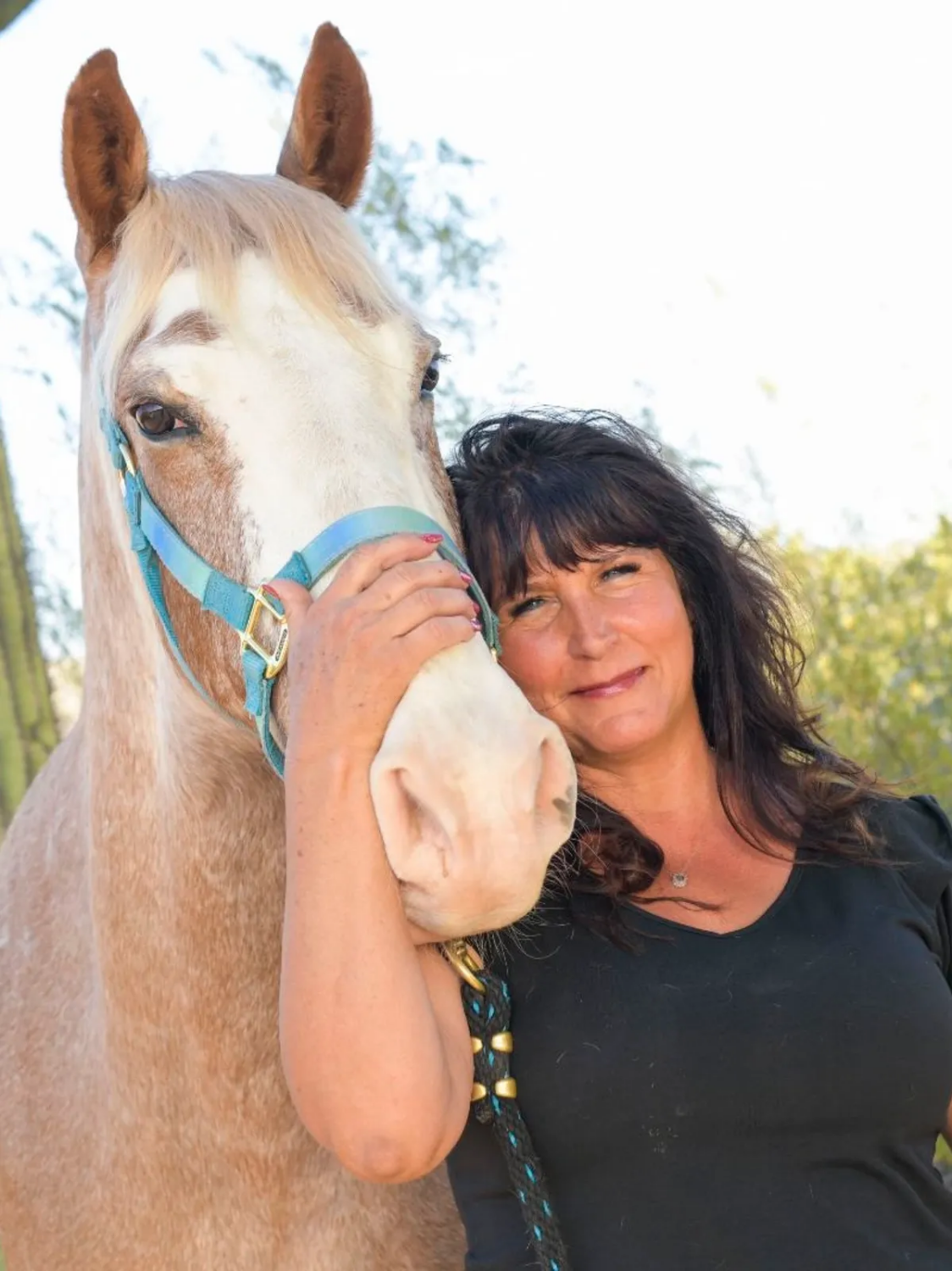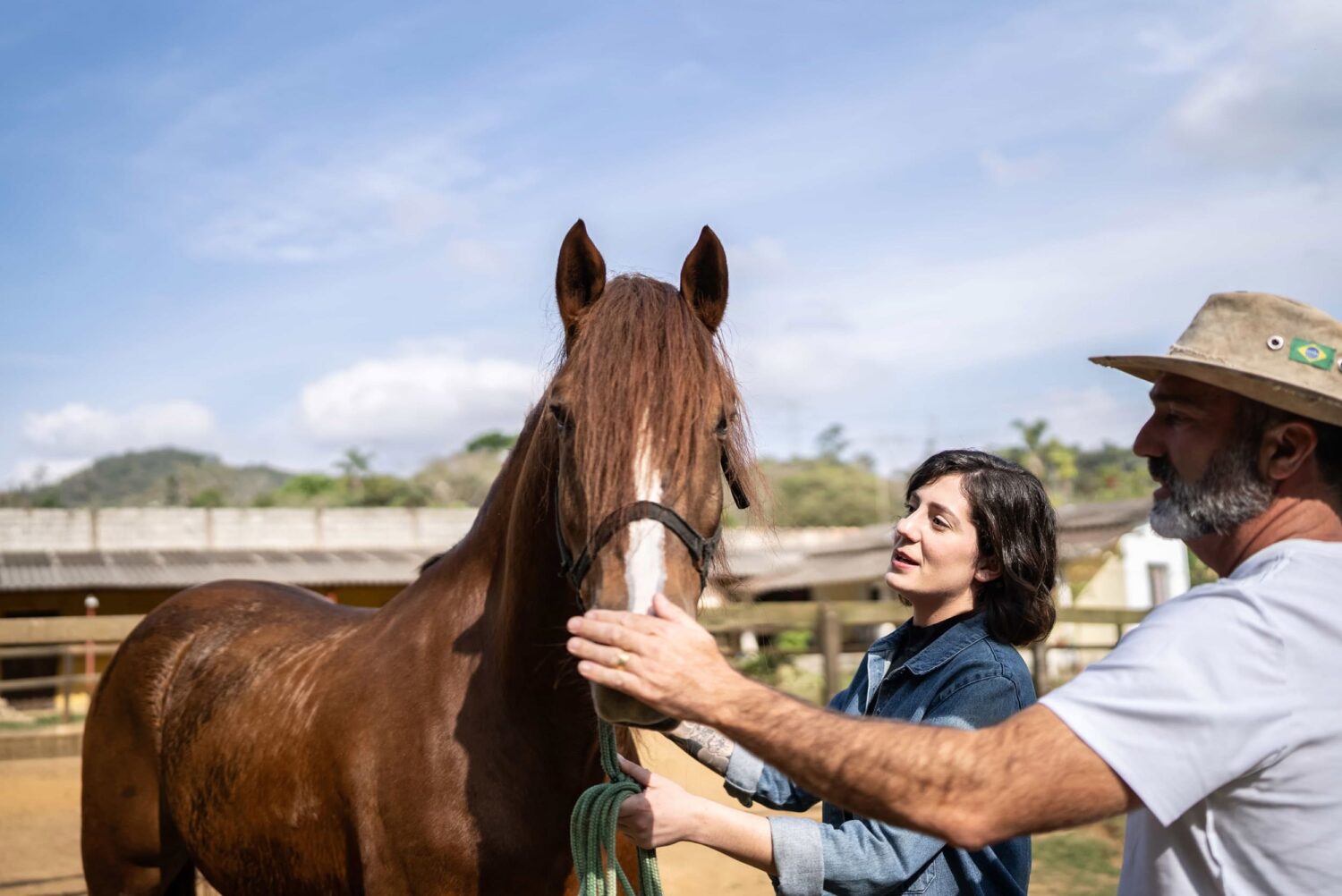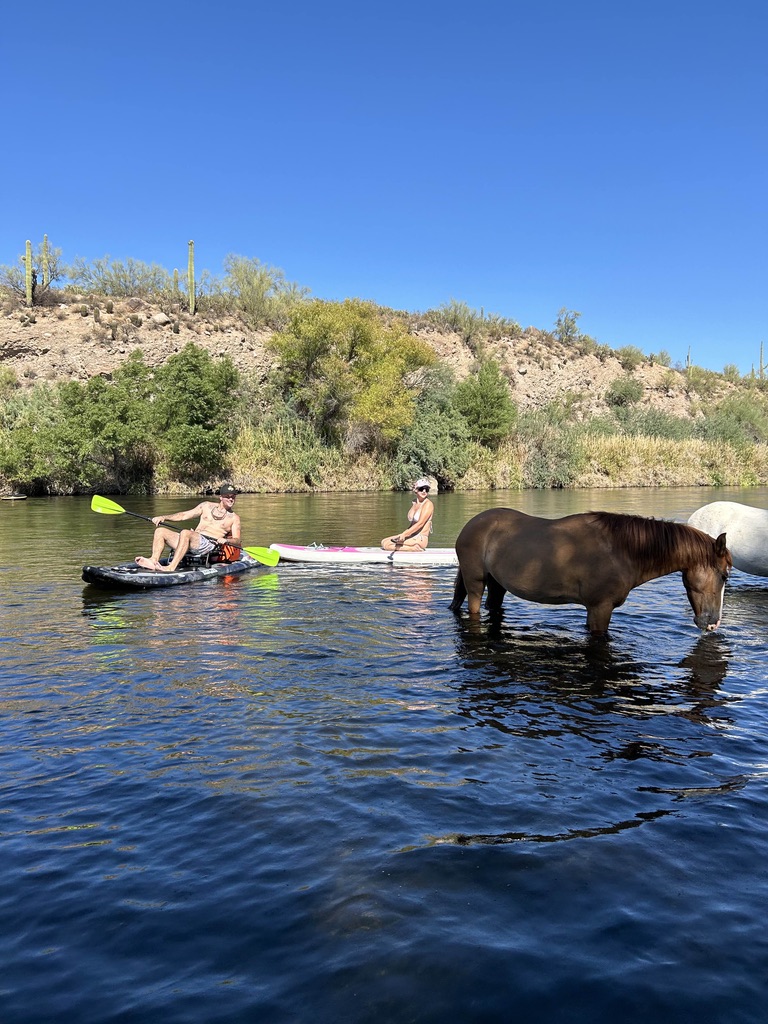Equine Therapy Solutions

At Rock View Recovery, we believe in innovative, evidence-based treatments that support the whole person—mind, body, and spirit. Our equine therapy program is one of the many ways we help you rediscover a sense of self, build emotional strength, and move confidently through recovery. Located in the heart of Maricopa County, our center serves the Phoenix metropolitan area with care that meets you where you are.
Equine therapy is more than just spending time with horses. It’s a powerful experience that combines emotional awareness, behavioral growth, and healing through connection. This unique form of therapy gives you the chance to build trust, learn responsibility, and reconnect with the present moment—all while engaging with one of nature’s most sensitive and responsive animals.
How Equine Therapy Works
Equine therapy, also known as equine-assisted psychotherapy (EAP), involves guided interactions with a horse under the supervision of trained mental health professionals. You won’t need any riding experience or horse knowledge to benefit from these sessions. The therapy is about presence, not performance.
During sessions, you may engage in activities like:
- Grooming the horse
- Leading the horse with a halter and lead rope
- Feeding or caring for the horse
- Observing how the horse responds to your emotions and actions
These activities reflect your inner emotional state and offer real-time feedback, which makes them a valuable complement to more traditional therapy approaches.
Unlike talk therapy, where you might struggle to express emotions with words, equine therapy gives you a non-verbal, experiential path to growth. Horses are highly intuitive and react honestly to human body language, emotion, and energy. Their reactions can show you how your emotions are showing up and help you shift those patterns in real time.

Benefits of Equine Therapy for Mental Health & Addiction Recovery
Working with horses can open the door to powerful change, especially when you’re navigating the challenges of addiction or mental health recovery. At Rock View Recovery, equine therapy is a safe, welcoming space where you can build awareness, confidence, and emotional resilience in a comfortable, supportive setting.
Here are just a few of the ways equine therapy supports your recovery journey:
- Non-Judgmental Support: Horses respond to energy and presence, not appearance or past mistakes. Their non-verbal feedback creates a judgment-free space where you can explore emotions without fear of criticism. If you’re hesitant to open up in traditional counseling sessions, the calm presence of a horse can help you feel more at ease and less pressured. Many clients describe this as a turning point in their willingness to engage in therapy.
- Improved Emotional Awareness: As you care for the horse, you’ll learn how your emotions affect your behavior and how to recognize feelings as they arise. This awareness is a key part of emotional regulation. Horses respond instantly to subtle shifts in your energy, encouraging you to pause, check in with yourself, and adjust. This feedback loop helps you develop the self-reflection skills that are essential in both therapy and everyday life.
- Building Trust & Confidence: Creating a bond with a horse requires patience, consistency, and trust. These interactions can mirror the challenges and rewards of rebuilding trust in your own life. The sense of accomplishment you gain by earning a horse’s trust can be deeply empowering—especially if trust has been broken in your relationships due to addiction. With each successful interaction, you build confidence in your ability to form meaningful, healthy connections.
- Stress & Anxiety Reduction: The rhythmic nature of grooming, the quiet surroundings, and the connection with the animal help calm your nervous system. This can lead to reduced anxiety and improved focus. Just being near horses has been shown to lower cortisol levels, which supports a more balanced emotional state. In the safe environment of equine therapy, you can slow down, breathe more deeply, and develop healthier ways to manage stress.
- Enhanced Social & Communication Skills: Learning to interact with the horse and your therapist at the same time builds skills in non-verbal communication, listening, and empathy—key tools for healthy relationships. Horses demand clarity and consistency, which pushes you to improve how you express yourself. You’ll also explore your body language, tone, and timing—critical aspects of how you connect with others.
- Responsibility & Routine: Caring for a horse requires consistency, presence, and effort. This helps establish healthy routines and reinforces the importance of responsibility, which is especially important in long-term recovery. Feeding, grooming, and guiding a horse provides a clear purpose and structure, which many people in early recovery find grounding. It’s a gentle but powerful reminder that your actions matter and that you’re capable of showing up—for yourself and others.
Each interaction gives you a chance to reflect, adjust, and practice new behaviors in a supportive setting. That’s what makes equine therapy such a unique and powerful addition to your treatment plan. It’s not just therapy—it’s a hands-on, emotionally engaging experience that supports the kind of growth and healing that leads to real, lasting change.
Our Approach at Rock View Recovery
Our equine therapy program is part of a broader system of care designed to support you from day one of treatment through long-term sobriety. We believe that you deserve therapy that is compassionate, personalized, and grounded in real-world experience. That’s why our company offers multiple levels of support and guidance as part of your recovery journey:
- Residential Care: In our Residential Program, you’ll receive 24/7 support from a multidisciplinary team of experts in a structured healing environment. Equine therapy is integrated into your weekly schedule to help you process emotions, build routine, and find moments of peace and presence.
- Transitional Living: As you move forward in treatment, our Transitional Living program offers a supportive bridge between residential care and independent living. You’ll continue therapy, develop life skills, and stay connected to the recovery community while taking on more personal responsibility.
- Aftercare & Alumni Support: Recovery doesn’t end after your formal program ends. We offer aftercare planning, peer mentorship, and alumni events that keep you connected to your goals and your support system. This ensures you continue to grow and stay grounded in the tools and relationships that support lasting healing.
We view equine therapy not as a standalone service, but as part of a holistic, integrated care plan. When paired with counseling, group sessions, and other therapies, it becomes one of the most transformative tools available in your rehabilitation process.

Frequently Asked Questions
What are some daily habits that support recovery?
Daily habits like moving your body, eating nourishing meals, practicing mindfulness, and maintaining a consistent routine can help keep you on track. It’s also important to stay connected to a recovery community or support group and prioritize your sleep and self-care. Equally valuable is setting aside time each day to reflect on your progress, celebrate small victories, and plan for challenges ahead. Creating a schedule that includes physical, emotional, and social activities helps create balance and reinforces a healthy lifestyle.
How can I manage stress without turning to substances
Healthy stress management includes deep breathing, journaling, physical activity, creative hobbies, and spending time in nature. Practices like equine therapy or guided meditation offer calming routines that help you process emotions and build inner peace.
What role does nutrition play in mental health recovery?
Nutrition plays a big role in how you feel both physically and emotionally. A balanced diet supports brain function, reduces mood swings, and gives your body the fuel it needs to heal. Staying hydrated and eating whole foods can make a noticeable difference in your mental clarity and energy levels.
How can I rebuild relationships affected by addiction?
Rebuilding trust takes time and consistency. Open communication, accountability, participation in family counseling, and willingness to listen are essential. Our programs offer resources for family healing, helping you strengthen those bonds.
Are there additional therapies that complement equine therapy?
Yes! At Rock View Recovery, equine therapy is paired with other therapies like cognitive-behavioral therapy (CBT), mindfulness practices, music and art therapy, and group counseling. These combined approaches give you well-rounded support for your recovery.
Start Your Healing Journey Today
If you’re ready to begin a new chapter in your recovery, Rock View Recovery is here to walk alongside you. Our equine therapy program provides a unique, evidence-based solution to support your healing, build your confidence, and help you reconnect with your purpose.
We’re proud to serve Maricopa County and the greater Phoenix metropolitan area with programs that prioritize your growth, your goals, and your long-term wellness. Our treatment options feature a range of holistic therapies, including art, mindfulness, music, recreational, yoga, and more.
Equine therapy can be the turning point you’ve been looking for. Whether you’re new to treatment or continuing your journey, the connection you build with a horse can restore your trust in yourself and others. You’ll develop life-changing insights, one step at a time.
Don’t wait to reclaim your life. Reach out to Rock View Recovery today and discover how our equine therapy service can help guide you toward lasting transformation.